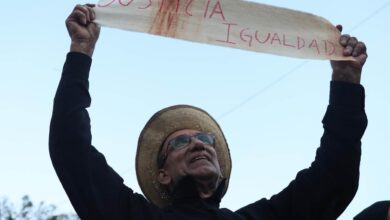The Latin American countries reject the sale and possession of weapons for civilians
In the United States, the port of arms is legal. However, not all countries are in favor of the sale and free bearing of weapons

The United States arms control policy has been in the sights of other countries in the world over the years, due to the incidents that have caused its use in different areas of the country. In the U.S. the port of arms is legal and is protected by the Second Amendment to the Constitution of that country that belongs to the Bill of Rights, which gives citizens free rein to carry weapons for self-personal. However, not all countries agree with the sale and free possession of weapons, since they consider that only the relevant authorities should handle this type of elements. The use of weapons in the United States is common since the country has a large number of these elements in their states and the distribution of these is a fairly profitable business.
Leer en español: ¿Qué posición tienen los países de América Latina con respecto al control de armas?
In general, Latin countries reject the sale and possession of weapons for civilians and have laws that prohibit their citizens from acquiring them, or that involve an extensive process to obtain one. Argentina, for example, has a specialized system in the prevention of the use of weapons in civilians, since they have entities such as the National Agency for Controlled Materials (ANMaC, by its acronym in Spanish) that control this type of activity. On the other hand, there is the case of Venezuela, which in 2002, due to a large number of deaths caused and the recurrent violence suffered by the country years ago, created the Law for the Disarmament and Control of Weapons and Ammunition, which prohibits the sale of weapons and missiles, and also makes it very difficult for citizens to carry them.
Colombia established since 2017 a decree that limits access to arms to its inhabitants: Decree 2268, and the figures of people who died due to this cause decreased significantly. This country has suffered the consequences of the armed conflict during the last 50 years and is one of the countries with the largest number of armed groups. In addition, it has the highest figures of kidnapping, missing persons, and illegal sales. All of the above occurred in the country due to political differences and the decision of certain groups to arm themselves. For its part, Brazil, like Colombia, has an important social problem and this leads the country to a situation of constant violence. This nation is one of the strongest countries in terms of arms production and is considered one of the world powers in this field. Recently the Congress approved the carrying of weapons to transit agents. Brazil is entering IGNORE INTO a strong internal debate due to this issue, since its inhabitants in different professional fields could have access to certain types of weapons for their "defense", according to several bills that the Congress is advancing.
The truth is that as the years go by, the United States is the clear example that it is necessary to evaluate the psychological conditions of citizens, before allowing them to obtain weapons. In addition, the numbers of deceased speak of the social problem that arms generate in school and public environments, where not all people carry weapons because they do not consider that they need them for their defense while others take advantage of these laws to commit mass crimes, and even in most cases end up committing suicide after committing those crimes. Most Latin countries are opposed to giving their citizens free access to armaments and opt for only their armed forces and experts to manage them. On the whole, they have made petitions to the leaders who support this way as a defensive method to evaluate it, giving evidence of the reduction of deaths of people with disarmament policies or weapons control.
Latin American Post | Cindy Nieto Monroy
Translated from "Los países latinos rechazan la venta y posesión de armas para civiles"





